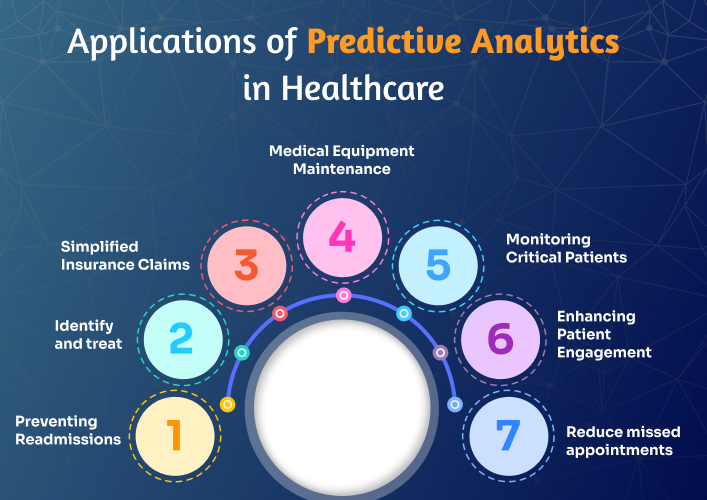Applications of Predictive Analytics in Healthcare

In numerous ways, predictive analytics for healthcare is transforming the industry. Utilizing more efficient resource allocation and enhancing healthcare outcomes, predictive analytics revolutionizes the way in which patients are attended to. The following are the examples of predictive analytics in healthcare that provide the greatest value to healthcare providers:
Prevent patient readmissions
Hospital readmissions constitute a financial concern for Medicare. Patterns and contributing factors to readmissions can be identified through the analysis of historical patient data by predictive analytics models. Based on the probability of readmission, these models are capable of categorizing patients into distinct risk groups. Thus, it enables medical professionals to implement focused interventions in a timely manner, thereby averting readmissions.
Identify and treat
In the critical sector of population health management, healthcare predictive analytics has an indispensable function. Predictive analytics enables healthcare organizations to detect and manage individuals prior to the onset of chronic diseases. This method employs analysis of patients based on demographics, disability, age, and other relevant factors, as well as their previous treatment patterns.
Smooth insurance claiming procedures
Predictive analytics also has the potential to dramatically improve another aspect of the healthcare industry: the filing of insurance claims. Hospitals may save time and money by using these technologies to handle insurance claims more efficiently.
Maintaining medical equipments
Predictive analytics in healthcare helps in maintaining medical devices and tools by looking into their technical faults. For example, if the medical machinery gets worn out due to regular usage then, predictive tools will investigate the faults and intimate them immediately.
Keeping tabs on critical patients
A predictive tool can help in keeping an eye on critical patients admitted to ICUs to immediately detect any risk to their health. Thus, doctors can take immediate action to treat the patient. The health of critically ill individuals is constantly tracked by the prediction tool. Information such as pulse, blood pressure, oxygen levels, respiration rate, and more may be gathered in this way.
Improve patient engagement
For efficient treatment, this kind of patient participation is crucial. Predictive analytics allows for early detection of a patient’s noncompliance, allowing for proactive actions to be made to ensure the patient’s continued health until the next scheduled checkup or treatment. Providers now routinely employ predictive analytics in healthcare to develop individualized profiles for their patients, which contain strategies for connecting with each person.
Reduce missed appointments
Predictive analytics may analyze past data to determine the causes of missed appointments. It aids in determining whether patients, based on historical behavior, demographic information, or other characteristics, are most likely to skip scheduled appointments. Furthermore, the predictive healthcare app may send appointment reminders to individuals.
Conclusion
In conclusion, predictive analytics has emerged as a game-changing factor in the healthcare industry by providing various applications. Healthcare firms may improve patient care, simplify operations, and make wise choices by using the power of data. A more proactive and patient-centered environment can be shaped in large part by predictive analytics in healthcare. It helps to avoid illnesses, optimize resource allocation, and improve overall efficiency. Predictive analytics’ potential to bring forth new developments and better healthcare outcomes stays high as it develops.
FAQs
What is predictive analytics in healthcare?
How does AI predictive analytics in healthcare help?
Can predictive analytics be applied to personalized medicine?
How does predictive analytics contribute to cost reduction in healthcare?
Is patient privacy a concern in predictive analytics in healthcare?
Ravi Bhojani is the Chief Marketing Officer (CMO) at Alian Software, where he spearheads the company’s marketing strategies and drives its brand presence in the competitive IT services landscape. With over a decade of experience in the technology and marketing sectors, Ravi has consistently demonstrated his ability to blend innovative marketing techniques with deep industry knowledge to deliver outstanding results.